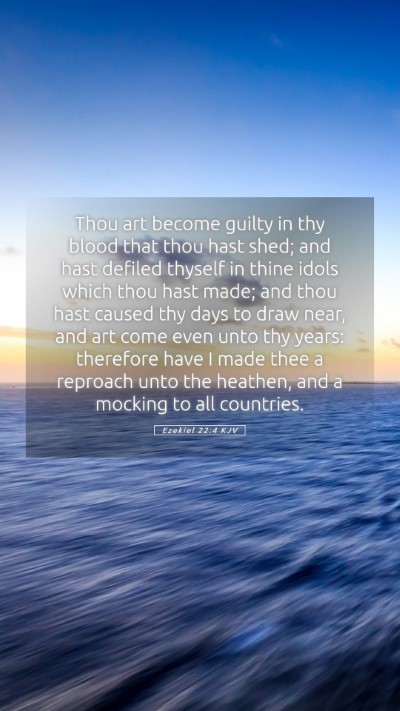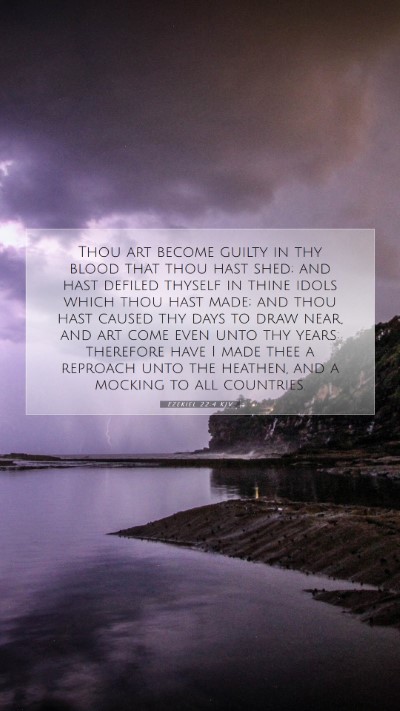Ezekiel 22:4 - Understanding the Verse
Bible Verse: Ezekiel 22:4 - "Thou art become guilty in thy blood that thou hast shed; and hast defiled thyself in thine idols which thou hast made; and thou hast caused thy days to draw near, and art come even unto thy years: therefore have I made thee a reproach unto the heathen, and a mocking to all countries."
This verse from the book of Ezekiel serves as a powerful indictment against Jerusalem, highlighting themes of guilt, idolatry, and impending judgment. As we delve into its meaning, we can draw insights from established public domain commentaries by notable scholars such as Matthew Henry, Albert Barnes, and Adam Clarke.
Summary of Biblical Exegesis
The understanding of Ezekiel 22:4 reveals several key aspects of biblical truth regarding sin, judgment, and divine scrutiny:
-
Guilt and Consequences:
Matthew Henry notes that the guilt referenced is not merely a feeling but a legal obligation—a charge against Israel for the bloodshed and sins committed within the city.
-
Idolatry as Spiritual Defilement:
Albert Barnes emphasizes that the act of making idols leads to spiritual defilement, suggesting that Israel’s idolatrous practices attracted God’s wrath and resulted in their degradation.
-
Self-Inflicted Judgment:
Adam Clarke interprets the phrase regarding drawing near to their years as a metaphor for the approach of judgment days brought upon themselves due to their actions.
-
Reproach Among Nations:
This verse also serves as a declaration that Israel’s actions have made them a reproach among surrounding nations, indicating the loss of their identity as God’s chosen people.
Bible Verse Commentary
In Ezekiel 22:4, the prophet conveys not only the sinfulness of Jerusalem but also the seriousness of divine justice. By shedding innocent blood and engaging in idolatry, they have become guilty and have invoked God’s judgment against themselves. This brings forth a sobering reminder of the impact of sin.
Detailed Explanation and Application
This verse can serve a dual purpose; it acts to inform our understanding of the historical context of Jerusalem while also providing applicable lessons for contemporary believers:
-
Historical Context:
The passage reflects the moral decay of Jerusalem during the time of Ezekiel, a pivotal period preceding the Babylonian exile. Understanding the significance of their actions provides insight into God's displeasure and the necessity for repentance.
-
Contemporary Application:
The themes of idolatry and guilt extend into modern life, where contemporary idols may not be physical images but rather pursuits of power, wealth, or self-interest. This highlights the need for introspection and alignment with God's will.
Cross References
This verse of Ezekiel further echoes themes found in other biblical passages:
- Leviticus 18:24-30: A call to avoid the sins of the nations.
- Isaiah 1:15-17: Addressing the consequences of sin and the call for justice.
- Jeremiah 6:15: How people become desensitized to sin.
Conclusion
Ezekiel 22:4 encapsulates a profound warning about the consequences of sin, particularly idolatry, and serves as a serious reminder of the need for accountability and repentance. Its teachings are relevant both in historical context and for today's believers, urging them to uphold their integrity and avoid the pitfalls of spiritual defilement.
For those seeking deeper bible verse meanings and understanding scripture, this verse encourages an exploration of God's justice, grace, and the righteousness He calls us all to.


